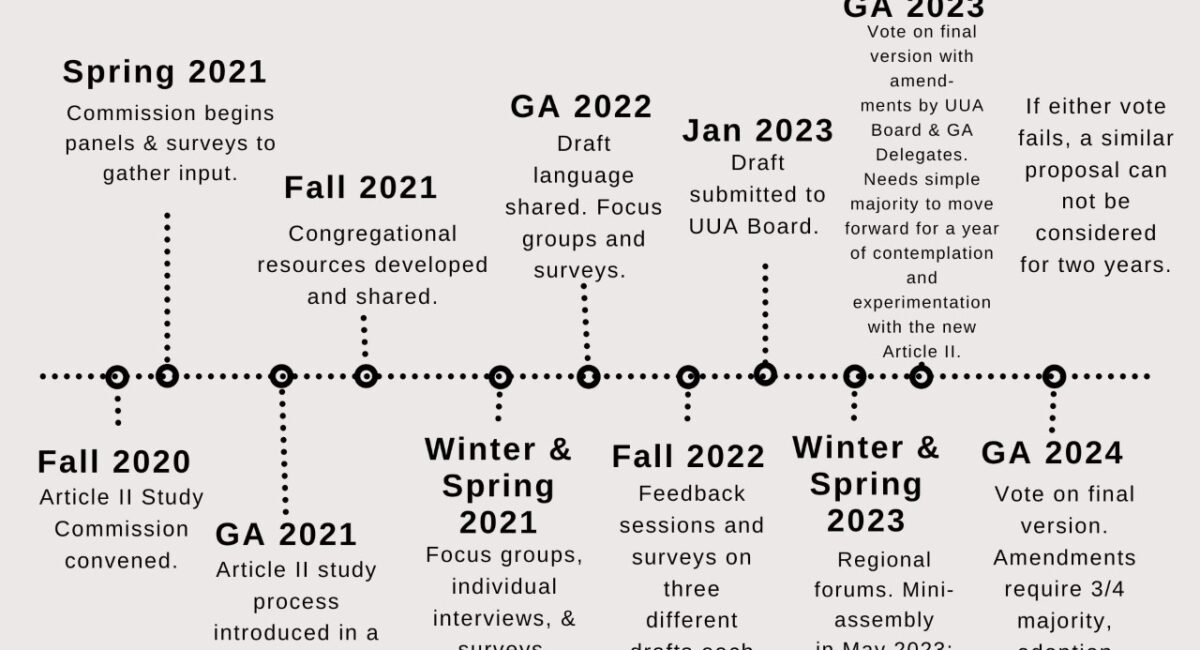
In 1887, these were some of the things most commonly believed in Unitarianism, adopted by a vote of 59 to 13. I won’t be reading aloud all of the bullet points, but you can see them on the screen:
We believe that to love the Good and to live the Good is the supreme thing in religion.
(Okay, I can get behind that).
We hold reason and conscience to be final authorities in matters of religious belief.
(Umm, okay, but only sort of for me, though for some of you, you might be fully there.)
We believe that we ought to join hands and work to make the good things better and the worst good, counting nothing good for self that is not good for all.
(I’m down for that. 100%. Sounds like collective liberation, baby.)
We worship One-in-All — that life whence suns and stars derive their orbits and the soul of man its Ought, — that Light which lighteth every man that cometh into the world, giving us power to become the sons of God, — that Love with which our souls commune.
(Umm, yeah. That confuses me. And makes me itch.)
In 1936 (again from the Unitarians ), in a statement that named both “agreements and tensions,”
affirming that the social implications of religion are indispensable to its vitality and validity, as expressed in terms of concern for social conditions and the struggle to create a just social order.
(What I hear here is that social action, that deeds not creeds, are essential. Again, I am down with that.)
Here’s an interesting one, given how few Americans, including Unitarian Universalists, attend Sunday services:
affirming the necessity for worship as a deliberate effort to strengthen the individual’s grasp of the highest spiritual values of which he is aware.
Or this one, about which I know there is no agreement among Unitarian Universalists of this day and age:
affirming the rational nature of the universe.
Yet, I must say, when I read these statements, even though the language often offends (the word “man” as generic or the Christian-centered-ness), I perceive the threads of our faith movement over time. If I hold the language loosely, I can see these as historic shadows of where we are now and where we might be going.
And perhaps most of all, I am reminded that the guiding beliefs or principles or values about who we are and how we act in the world have always been evolving, there has always been a living process of revising what once was in order to bring the words up to date. It is good we do not write these things in stone. It is good we have a special ancestral relationship with the pencil and the eraser.
When the two Christian heretical sects, Unitarianism and Universalism, joined forces in 1961, we created a set of bylaws to guide our new association.
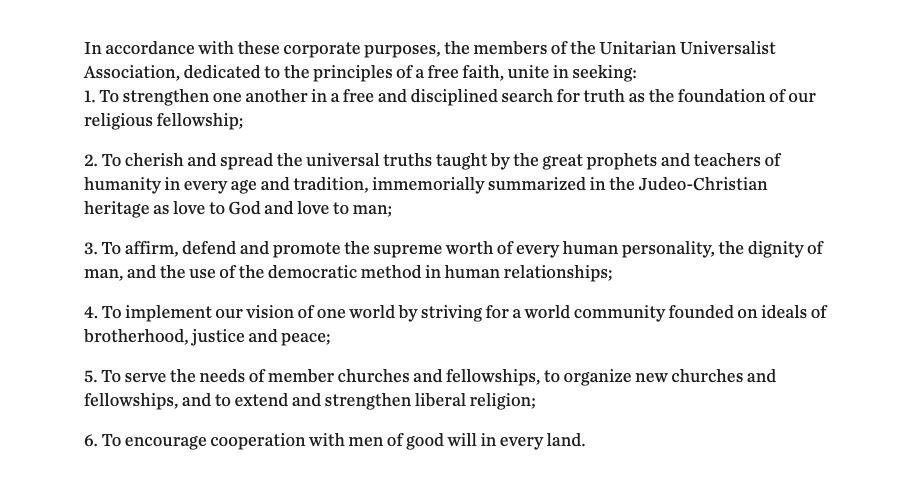
At that time, there were six principles, awash in patriarchal language. As there has always been (and likely always will be), there is religious language. The second principle ended with the phrase “as love to God and love to man.”
So yes, revisions were bound to happen. Yet the threads are there, more directly the closer we are in time, but ever-present with those from 19th century documents or the early 20th century one.
It was in 1987 that we adopted the 7th Principle and added to our Sources the earth-based one. And for the past decade, there has been a grassroots movement to add the 8th Principle, a movement we joined a year ago when our congregation adopted it as one of our guiding lights, whether or not the Association as a whole does.
And so, here we are. Our bylaws require that they are regularly – I believe every 15 years – reviewed, which sometimes leads to proposed revisions, which are sometimes pursued and at other times, die a quiet or not so quiet death, and at other times, gain momentum and support. Which just may be the case this time, as the Article II Study Commission has proposed significant revisions to the bylaw which houses what we currently call our Principles, which currently houses our Sources.
And by significant, I mean foundational. I mean, not just add or subtract a principle here, change the wording of a Source there. I mean, language that references values and inspirations, rather than principles and sources. I mean, what some have called a deepening of our covenant among congregations, for that is what this is – it’s about the association of congregations, though many of us, myself included, use this language and these concepts to develop our identity as Unitarian Universalists.
Which is why changes to the principles might feel personal, might feel as if said changes are taking away something you cherish, rather than opening to the possibility that the future is a place of growth. It might feel like grief before it feels like that sense of possibility. It might feel like loss before it feels like resonance. It might feel like less before it feels generative.
Remember the thread:
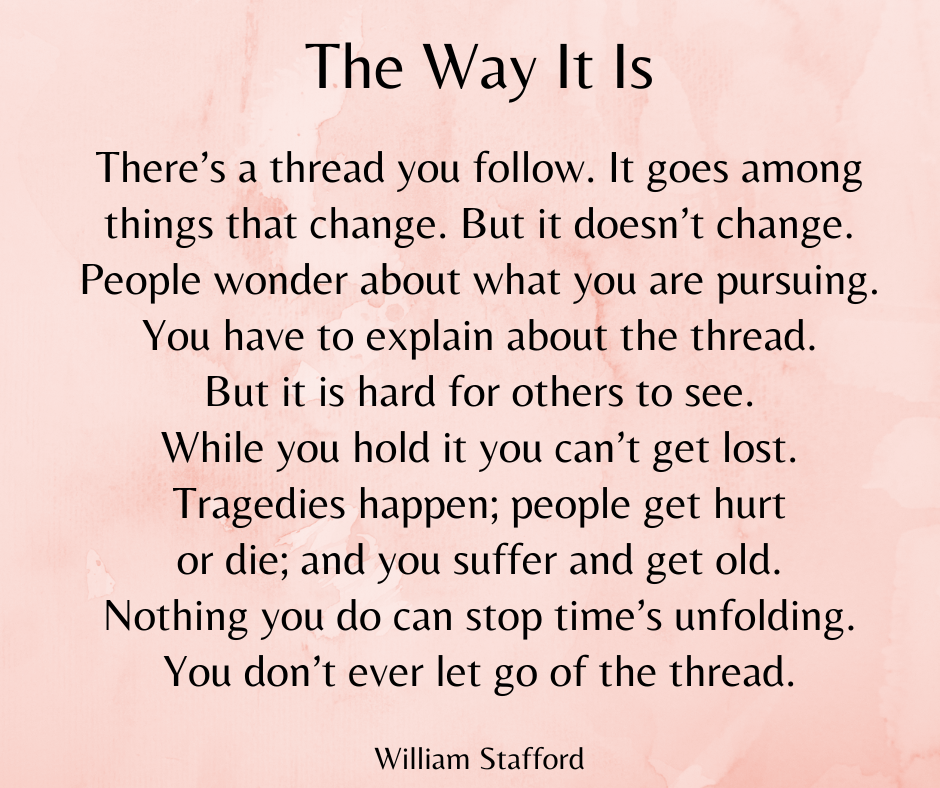
Listen to, hold onto, the thread of Unitarian Universalism, even as you consider letting go of what you have known, in order to be open to the possibility of what is to come.
While there are other changes in the proposal from the Article II Study Commission, I want to briefly name the changes just to the principles. In the proposal, principles have evolved into “values.” In an attempt to move away from a hierarchy that first through seventh or first through eighth implies, the values are described as “inseparable from one another” and presented visually in a way that centers love while the other values are equal with each other.
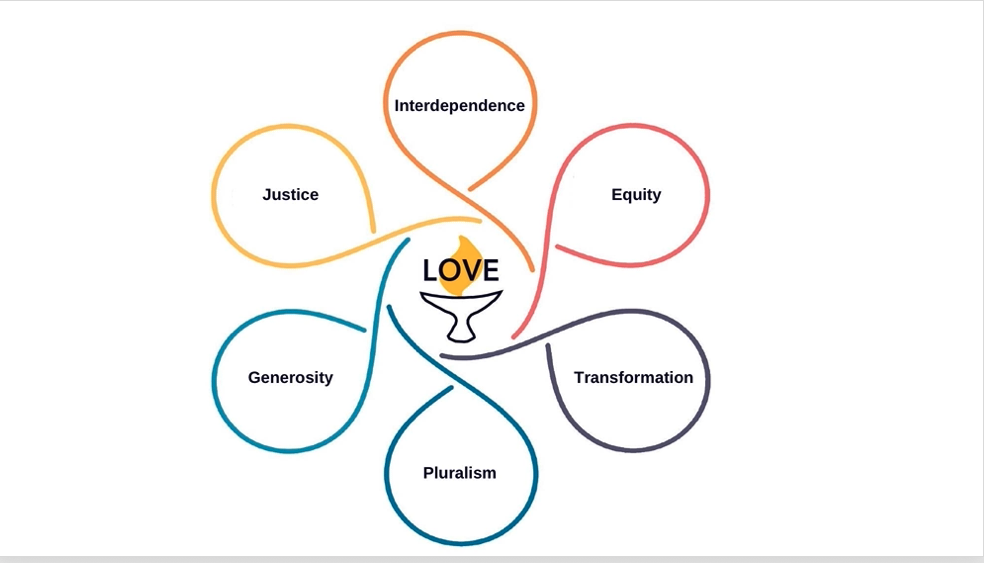
The values, beginning with Love, and then in no particular order, are:
- Love
- Interdependence
- Pluralism
- Justice
- Transformation
- Generosity
- Equity
In the proposal each of these values has a description. In the lectio divina activity after the offering – so just a few minutes away – we’ll introduce you to the descriptions, giving you a chance to reflect on them, sharing out loud what catches your attention, following a particular spiritual practice.
- Love
- Interdependence
- Pluralism
- Justice
- Transformation
- Generosity
- Equity
Our faith movement is voting on this proposal at GA this year. The order of service includes the timeline for voting on this, which includes the requirement that it be voted on two years in a row – a change this big cannot happen with just one vote. If you are interested in learning more, the eblast will contain links for you to follow up on.
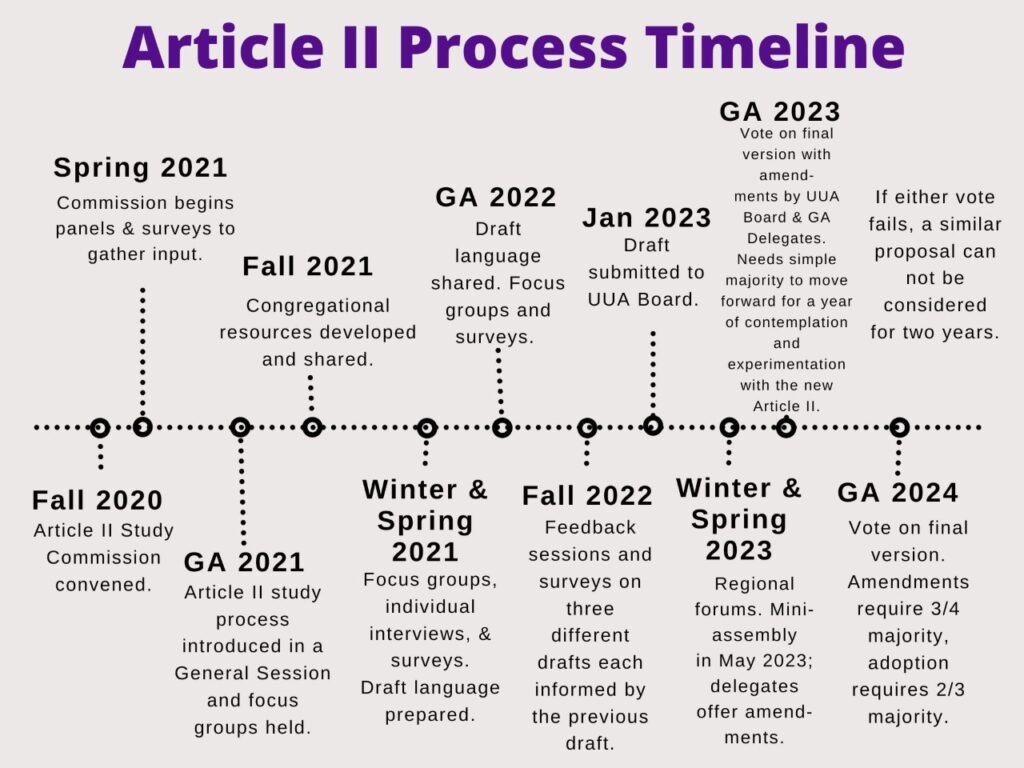
And you can go to GA in Pittsburgh at the end of June to be a part of this historic process. The Board is helping up to ten congregants with the cost of registration. If you are interested, you should email me sooner rather than later.
Keep listening for that thread. Make sure you don’t lose hold.
The sermon ends with these words, written one hundred and one years ago by one of our Universalist ancestors, Rev. Lewis Beals Fisher.
“Universalists are often asked to tell where they stand. The only true answer to give to this question is that we do not stand at all, we move…. We grow… as all living things forever must do. The main questions with Universalists are not where we stand, but which way we are moving…. Our main interest is to perceive what is true progress, and to keep our movements in line with that, and not to allow ourselves to move round and round in circles simply… like a squirrel in its cage…. Old worn phrases are always losing their old meanings, and must forever be finding new meanings in the light of new experiences.”
So be it. See to it. Amen.
